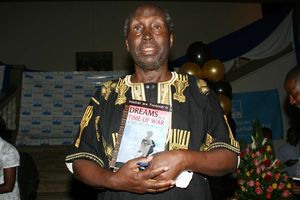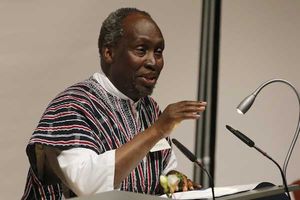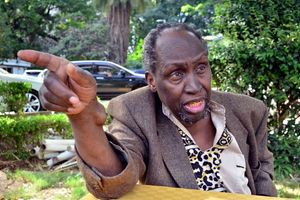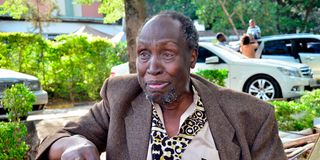
Renowned author Ngugi wa Thiong'o during an interview on February 7, 2019.
“University” has been on my mind most of this week. It started with the shocking news that some prominent universities somewhere on the globe were being “instructed” by political functionaries on who to admit to or dismiss from their schools.
My thoughts, which I want to share with you, have been running along three tracks.
The first one is the personal realisation and admission that I have lived nearly all my adult life “at” university. The second track is my linguistic instinct that the term “university” (from Latin, “universitas”) means and suggests “all-embracing, a unit transcending most narrow boundaries.
I borrowed my third track from a senior journalist, who pointed out that universities existed long before the rise of “nation” states, and they will probably outlive them.
But, as fate would have it, I was just settling down to expanding and expounding on these thoughts when the shattering news of Ngugi wa Thiong’o’s departure broke.
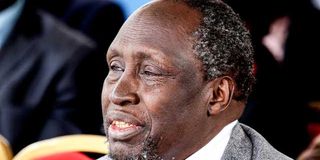
Renowned literature scholar Ngugi wa Thiong’o when he visited Eastleigh Boys High School on June 10, 2015, to celebrate 50 years of his book ‘Weep Not Child’.
I will not say much about this Colossus of our literary glory (and sorrow). Worthier pens and lips are saying the needful, even in this very paper. Moreover, I have told you, in this column, of most of my precious Ngugi moments.
Also Read: Ngugi wa Thiong’o: Life and Times
Maybe I can recap by saying that Ngugi taught me on two occasions. The first was during his tenure of a senior creative writing fellowship at Makerere, following his flight from UoN in the aftermath of the JM Kariuki debacle.
Then, on my own flight from Uganda, he accommodated me for some time at the UoN Department of Literature and, later, allowed me to audit (freely attend) his postgraduate seminars.
But before all that, I had had my first encounter with him in Yorkshire, England, when he was a graduate student at Leeds University and I was a visiting undergraduate scholar, together with the late Honourable Joshua Angatia, at the University of York. Ngugi’s former teacher, and later mine, at Makerere, David Cook, connected us in York, in 1966.
We later visited Ngugi in Leeds, where he shared digs with the late Grant Kamenju, who was soon to be my lecturer in Dar es Salaam.
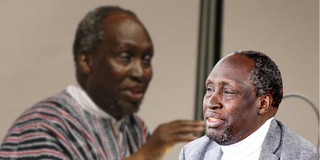
Renowned literature scholar Ngugi wa Thiong’o.
Anyway, the count there gives us all of 59 years of interaction with the literary legend and, indeed, I could regale you with details of my impressions for the rest of the day.
But I will share only three, which I think are most relevant to the problem of political interference in intellectual and, especially, university affairs.
Many of us in Kenya and Uganda, and, indeed, across Africa, felt that Ngugi deserved top international recognition for his writing.
It is skilful, it is thematically serious, and it is quantitatively hefty and substantial.
Best work
But what impresses me most about Ngugi is that he produced most of his best work under intense persecution, threat, detention and, ultimately, irreversible exile. This was because he insisted on thinking, saying, writing and teaching what he thought was worth sharing with his people.
The crude and power-hungry politicians of his day did not want him to open his people’s eyes to their plight and to the rulers’ excesses.
So, they, the politicians, invaded the sacred spaces of the university and cracked down on Ngugi and his comrades in order to silence them.
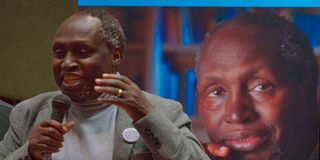
Author, playwright and critic Ngugi wa Thiong'o addresses fans on June 13, 2015 during a book signing to celebrate the golden jubilee of his first book 'Weep Not Child' in the Kenyan capital, Nairobi.
Those, like Ngugi, Micere Mugo, Alamin Mazrui, Ngugi wa Mirii, Prof Oyugi, Maina wa Kinyatti, Willy Mutunga and others, who refused to be silenced, “faced the music” of detention, torture, banning and sacking from their jobs by “acts of state”.
Those who could get away, fled into exile, where some have died and others remain. Those of us who remained here just had to tread cautiously, limiting the play of free thought, free exploration and free expression that is the essence of university and every healthy society.
Ngugi wa Thiong’o’s “universitas” spirit, recognising and accepting the various environments into which fate thrust him, enabled him to remain active and productive to the end. Imagine how richer and greater his work could and would have been if he and his comrades had been left alone, by the politicans, to carry out their work in peace at their home universities.
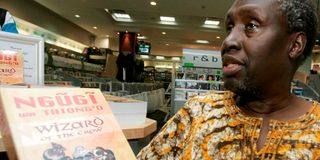
Kenyan author Ngugi Wa Thiong'o shows his book "Wizard of the Crow" during an interview with Reuters at a bookshop in downtown Nairobi on January 16, 2007.
Finally, I believe that the universal (international) nature and reach of the university institution played a significant role in Ngugi’s global success and triumph.
Whether at Makerere, Leeds, Yale, NYU or California Irvine, Ngugi survived and thrived because, apart from his huge talent, he was in a universal system, with respected, time-hallowed principles that everyone, including politicians, acknowledged.
The moral of the tale (kisa na maana) is that every university worth its name should be left to its right and freedom to pursue and promote knowledge without interference.
Buriani (fare thee well), Ngugi wa Thiong’o!
Read --> Ngugi wa Thiong’o: Life and Times
You may also check out this one --> World mourns as Ngugi turns into ‘a grain of wheat’
Prof Bukenya is a leading East African scholar of English and literature. [email protected]



